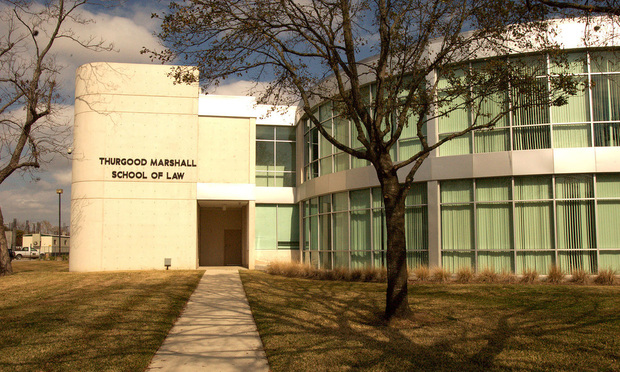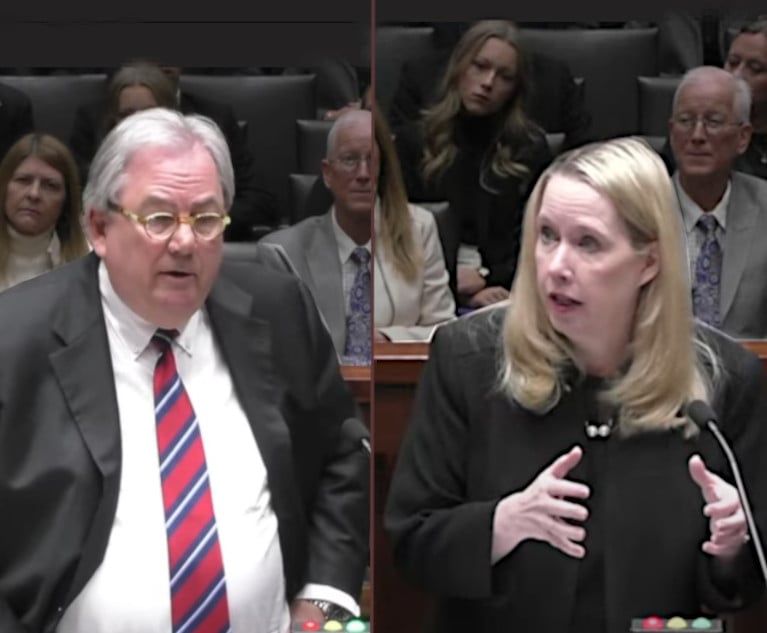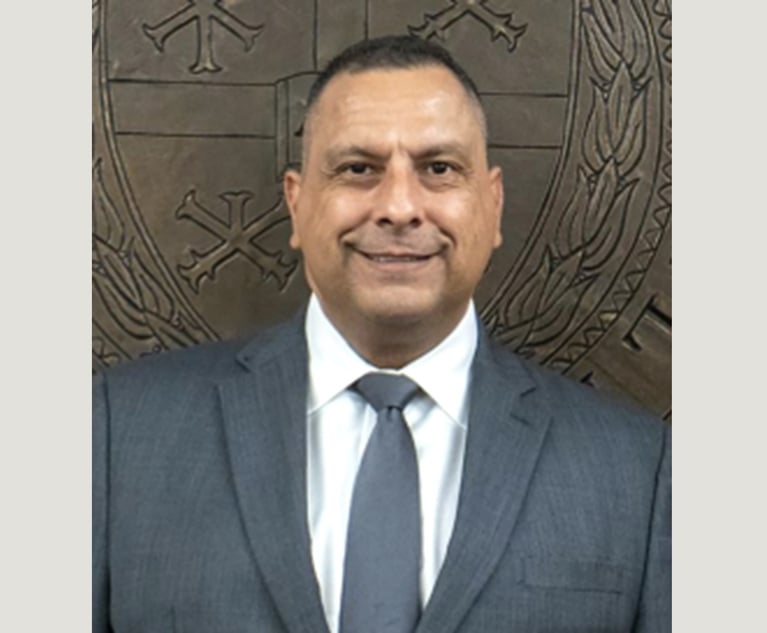Professor Alleges Reverse Discrimination At Texas' Historically Black Law School
"Non-white professors were treated much more favorably, and received deanships, titles, and directorships, despite being less qualified," said the complaint. "Race was a motivating factor in defendant's adverse treatment of plaintiff."
October 15, 2019 at 01:18 PM
4 minute read
 Texas Southern University Thurgood Marshall School of Law in Houston. Photo: Earlie Hudnall/TSU
Texas Southern University Thurgood Marshall School of Law in Houston. Photo: Earlie Hudnall/TSU
A professor at Texas Southern University Thurgood Marshall School of Law is blowing the whistle on what he says is a pattern of racial discrimination that harms students and the school's mission.
"Non-white professors were treated much more favorably, and received deanships, titles, and directorships, despite being less qualified," said the complaint in Champion v. Texas Southern University, pending in the U.S. District Court for the Southern District of Texas. "Race was a motivating factor in defendant's adverse treatment of plaintiff."
The plaintiff, Walter Champion, has worked at the school for 34 years and he's a fully tenured law professor, and alleged that his salary is much lower and he's been denied titled professorships and chair positions because he is white. Champion is suing the school for racial discrimination under the Civil Rights Act Title VII and under the Texas Whistleblower Act for allegedly leaving an endowed professor chair vacant in violation of state law.
Thurgood Marshall law school has faced allegations of discrimination in the past. In July 2017, the American Bar Association Section of Legal Education and Admission to the Bar, which accredits law schools, issued censures against the school for violation of an anti-discrimination accreditation standard and multiple academic standards. That censure came after a female law professor sued, claiming the school discriminated against her based on her gender.
In his original complaint, Champion claims that the school has hired administrators and professors who are not qualified and are racist, which is hurting the law school's mission of expanding the legal profession to underserved populations. He claimed that some professors can't answer simple questions about their course topics, they're not helping students and that the school consistently has the lowest bar passage rates in Texas.
"Many administrative decisions at [Thurgood Marshall School of Law] are based on race, racism, and racist cronyism, violate state funding statutes and anti-discrimination laws, violate [Texas Southern University] and [Thurgood Marshall School of Law] policies and faculty manuals, grossly misappropriate public monies and are ultra vires," the complaint said.
Champion alleged that he earns $153,000 annually, but a long list of minority law professors who are less credentialed earn more than that. His complaint said he's a nationally recognized sports law expert who's published 12 books with reputable legal publishers, and these accomplishments should qualify him for a titled professorship or chair position and a raise.
Yet in 2017, the law school chose another law professor over Champion for a titled professorship. Champion claimed that he's more experienced in years and scholarship, but the school chose the other professor because he's black while Champion is white.
From 2006 to 2012, Champion was named the George Foreman Professor of Sports and Entertainment Law, and he claimed the school intentionally underpaid him during that time. Then from 2012 to 2019, his title was revoked, and the school left the George Foreman professorship vacant, even though Champion is the only one at the school who is eligible for the position.
He alleged that allowing the George Foreman professorship to sit vacant violates the $1 million trust that set up the endowed position. Champion has informed the school's deans from 2012 to present that the position must be filled immediately or it's a violation of law regarding the control of trust funds. This is the basis of his whistleblower claim.
Texas Southern on Monday argued that the court should dismiss Champion's whistleblower claim because the university has sovereign immunity, which strips the court of jurisdiction. The Texas Whistleblower Act only waives sovereign immunity when the case is filed in Texas state courts, not in federal courts, said the motion to dismiss.
Houston solo practitioner Andrew Cobos, who represents Champion, declined to comment. No one from the press office of Texas Southern's law school immediately returned an email seeking comment. Neither did Assistant Texas Attorney General Matthew Deal, who represents the university.
Read the complaint:
This content has been archived. It is available through our partners, LexisNexis® and Bloomberg Law.
To view this content, please continue to their sites.
Not a Lexis Subscriber?
Subscribe Now
Not a Bloomberg Law Subscriber?
Subscribe Now
NOT FOR REPRINT
© 2025 ALM Global, LLC, All Rights Reserved. Request academic re-use from www.copyright.com. All other uses, submit a request to [email protected]. For more information visit Asset & Logo Licensing.
You Might Like
View All

Case With 'Serious Consequences for Corporate Law' Heads to Texas Supreme Court
5 minute read

How Uncertainty in College Athletics Compensation Could Drive Lawsuits in 2025
Trending Stories
- 1Gunderson Dettmer Opens Atlanta Office With 3 Partners From Morris Manning
- 2Decision of the Day: Court Holds Accident with Post Driver Was 'Bizarre Occurrence,' Dismisses Action Brought Under Labor Law §240
- 3Judge Recommends Disbarment for Attorney Who Plotted to Hack Judge's Email, Phone
- 4Two Wilkinson Stekloff Associates Among Victims of DC Plane Crash
- 5Two More Victims Alleged in New Sean Combs Sex Trafficking Indictment
Who Got The Work
J. Brugh Lower of Gibbons has entered an appearance for industrial equipment supplier Devco Corporation in a pending trademark infringement lawsuit. The suit, accusing the defendant of selling knock-off Graco products, was filed Dec. 18 in New Jersey District Court by Rivkin Radler on behalf of Graco Inc. and Graco Minnesota. The case, assigned to U.S. District Judge Zahid N. Quraishi, is 3:24-cv-11294, Graco Inc. et al v. Devco Corporation.
Who Got The Work
Rebecca Maller-Stein and Kent A. Yalowitz of Arnold & Porter Kaye Scholer have entered their appearances for Hanaco Venture Capital and its executives, Lior Prosor and David Frankel, in a pending securities lawsuit. The action, filed on Dec. 24 in New York Southern District Court by Zell, Aron & Co. on behalf of Goldeneye Advisors, accuses the defendants of negligently and fraudulently managing the plaintiff's $1 million investment. The case, assigned to U.S. District Judge Vernon S. Broderick, is 1:24-cv-09918, Goldeneye Advisors, LLC v. Hanaco Venture Capital, Ltd. et al.
Who Got The Work
Attorneys from A&O Shearman has stepped in as defense counsel for Toronto-Dominion Bank and other defendants in a pending securities class action. The suit, filed Dec. 11 in New York Southern District Court by Bleichmar Fonti & Auld, accuses the defendants of concealing the bank's 'pervasive' deficiencies in regards to its compliance with the Bank Secrecy Act and the quality of its anti-money laundering controls. The case, assigned to U.S. District Judge Arun Subramanian, is 1:24-cv-09445, Gonzalez v. The Toronto-Dominion Bank et al.
Who Got The Work
Crown Castle International, a Pennsylvania company providing shared communications infrastructure, has turned to Luke D. Wolf of Gordon Rees Scully Mansukhani to fend off a pending breach-of-contract lawsuit. The court action, filed Nov. 25 in Michigan Eastern District Court by Hooper Hathaway PC on behalf of The Town Residences LLC, accuses Crown Castle of failing to transfer approximately $30,000 in utility payments from T-Mobile in breach of a roof-top lease and assignment agreement. The case, assigned to U.S. District Judge Susan K. Declercq, is 2:24-cv-13131, The Town Residences LLC v. T-Mobile US, Inc. et al.
Who Got The Work
Wilfred P. Coronato and Daniel M. Schwartz of McCarter & English have stepped in as defense counsel to Electrolux Home Products Inc. in a pending product liability lawsuit. The court action, filed Nov. 26 in New York Eastern District Court by Poulos Lopiccolo PC and Nagel Rice LLP on behalf of David Stern, alleges that the defendant's refrigerators’ drawers and shelving repeatedly break and fall apart within months after purchase. The case, assigned to U.S. District Judge Joan M. Azrack, is 2:24-cv-08204, Stern v. Electrolux Home Products, Inc.
Featured Firms
Law Offices of Gary Martin Hays & Associates, P.C.
(470) 294-1674
Law Offices of Mark E. Salomone
(857) 444-6468
Smith & Hassler
(713) 739-1250






